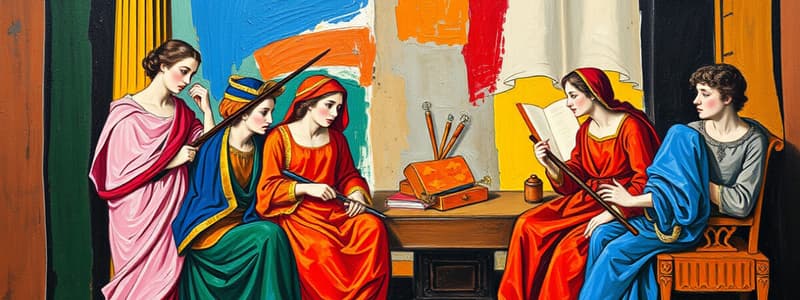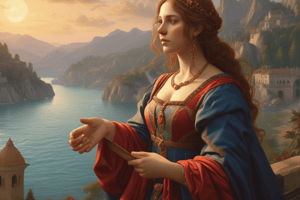Podcast
Questions and Answers
What is the time period for the Greek classical and Hellenistic periods?
What is the time period for the Greek classical and Hellenistic periods?
- 8th - 2nd centuries BC (correct)
- 1st century BC to 5th century AD
- 13th - 15th centuries
- 17th century
What is an example of literature from the Greek classical period?
What is an example of literature from the Greek classical period?
Homer's Odyssey
What is the time frame for the Roman classical period?
What is the time frame for the Roman classical period?
- 8th - 2nd centuries BC
- 1st century BC to 5th century AD (correct)
- 13th - 15th centuries
- 17th - 18th centuries
Name a literary work from the Roman classical period.
Name a literary work from the Roman classical period.
During which centuries did the Renaissance occur?
During which centuries did the Renaissance occur?
What are examples of literature from the Renaissance?
What are examples of literature from the Renaissance?
What is the time period for the French Neoclassical period?
What is the time period for the French Neoclassical period?
Name two works from the French Neoclassical period.
Name two works from the French Neoclassical period.
What time period does the English Neoclassical period cover?
What time period does the English Neoclassical period cover?
Can you provide an example of literature from the English Neoclassical period?
Can you provide an example of literature from the English Neoclassical period?
When did the German Neoclassical period take place?
When did the German Neoclassical period take place?
Name a literary work from the German Neoclassical period.
Name a literary work from the German Neoclassical period.
Flashcards are hidden until you start studying
Study Notes
Greek Classical and Hellenistic Periods
- Spanned from the 8th to the 2nd centuries BC.
- Notable work: Homer’s "Odyssey," a fundamental epic of ancient Greek literature.
Roman Classical Period
- Timeline: 1st century BC to the 5th century AD.
- Key texts include Cicero’s "Letters to Atticus" and "Brutus," which reflect political and philosophical themes of the time.
Renaissance
- Occurred in the 13th to 15th centuries.
- Marked by a revival of learning and art throughout Europe.
- Significant works: "The Canterbury Tales" by Geoffrey Chaucer and "The Divine Comedy" by Dante Alighieri, which represent the blending of classical and medieval thought.
French Neoclassical Period
- 17th century characterized by a return to Classical themes and structures.
- Prominent authors: Racine with "Berenice," Molière’s "Tartuffe," and La Fontaine’s "Adonis" showcasing drama and moral narratives.
English Neoclassical Period
- Encompassed the 17th and 18th centuries.
- Notable works include Dryden’s "Absalom and Achitophel," Swift’s "Gulliver’s Travels," and Pope’s "The Dunciad," which critique society and politics through satire.
German Neoclassical Period
- Spanning the 18th and 19th centuries, emphasizing reason and morality.
- Key writings: Lessing’s "Zur Geschichte und Literatur," Schiller’s "William Tell," and Goethe’s "The Sorrows of Young Werther," reflecting emotional depth and the human experience.
Studying That Suits You
Use AI to generate personalized quizzes and flashcards to suit your learning preferences.




